Results
-
£35.00
FINALE from Francesca da Rimini - Tchaikovsky, P - Mcknight, I
Tchaikovsky's symphonic poem Francesca da Rimini: Symphonic Fantasy afterDante, Op. 32, was composed in less than three weeks during his visit to Bayreuthin the autumn of 1876.This fantasia presents a symphonic interpretation of the tragic tale of Francescada Rimini, a beauty who was immortalised in Dante's Divine Comedy. Francescada Rimini, a noblewoman, fell in love with her husband's brother. After the loverswere discovered and killed in revenge by the husband, they were condemned toHell for their adulterous passions. Iain McKnight's arrangement of the exciting Finale was first performed by theLeyland Band at the 2011 Brass in Concert and was used to conclude the band'swinning performance.
In Stock: Estimated dispatch 1-3 working days
-
£50.00
Peniel - Ball, E
This work is not intended to actually portray in music the events described in Genesis, Chapter 32, although the varying moods were evoked by a re-reading of the story. However, the following sequence of ideas may sometimes prove useful in presenting the work to audiences.Under Divine compulsion, Jacob sets out with Family, retainers, servants and cattle, to return to his homeland (Introduction and Sections 1 - 3).He is brought news of possible attack by his estranged brother Esau (Sections 4 - 6).Jacob seeks guidance in a lone vigil and, wrestling with a divine visitor, at last wins acceptance at the place he names Peniel--The Prince of God. He goes forward with his people and becomes reconciled with Esau (Section 12 to the end).Eric BallDuration 9 mins
In Stock: Estimated dispatch 1-3 working days
-
 £12.00
£12.00The World Rejoicing (Brass Band - Study Score)
In searching for a common link between the brass band traditions of the various European countries that commissioned this work, I considered the fact that hymns have always played an important role in the relationship that brass bands have with their particular communities; and thus I turned to a well-known Lutheran chorale, Nun danket alle Gott (Now thank we all our God), written around 1636 by Martin Rinkart, with the melody attributed to Johann Crger. A number of composers have incorporated this chorale into their music, most famously J.S.Bach in his Cantatas no. 79 and 192, and Mendelssohn in the Lobsegang movement of his 2nd Symphony (the harmonization of which is usually used when this hymn is sung).It seemed fitting therefore for me to return to a compositional form I have used many times before (Variations) and to write a work based on this hymn. I have used it in a similar way to that which I employed in my Variations on Laudate Dominum of 1976 - that is, rather than writing a set of variations using elaborations of the complete tune, I have taken various phrases from the chorale and used them within the context of other musical material, applying an overall symphonic process of continuous variation and development. The structure, or sub-divisions of the work, which is through composed and plays without a break, is as follows: Prelude, Capriccio, La Danza 1, Processional, La Danza 2, Arias and Duets, Fuga Burlesca, Chorale, and Postlude.The work is also partly autobiographical - in the manner say of Strauss's Ein Heldenleben - in that I have incorporated into the score brief quotations from many of my other major works for brass band. In that respect, The World Rejoicing sums up a particular facet of my life as a composer, and reflects the admiration I have always had for what is surely one of the great amateur music-making traditions in the world.The World Rejoicing is dedicated 'in loving memory of my brother', Bramwell Logan Gregson, who sadly passed away in the Autumn of 2018.Edward Gregson
Estimated dispatch 7-14 working days
-
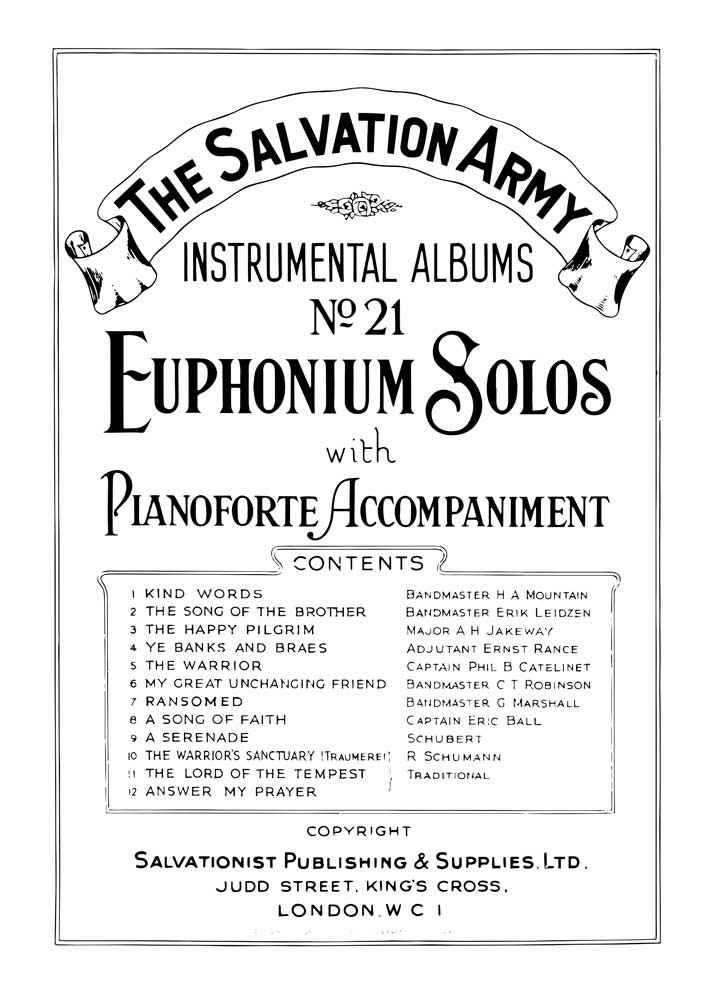 £14.95
£14.95Instrumental Album No.21 - Euphonium Solos
Includes: Kind Words; The Song of the brother; The happy pilgrim; Ye banks and braes; The Warrior; My great unchanging friend; Ransomed; A Song of Faith; A Serenade; The Warrior's Sanctuary; The Lord of the tempest; Answer my prayerInstrumentation: Euphonium with Piano Accompaniment
Estimated dispatch 7-14 working days
-
 £74.95
£74.95Radio City (Trombone Solo with Brass Band)
As youngsters growing up on the west coast of Scotland, my brother and I fell heir to an old valved radiogram which provided us with our first experiences of radio broadcasts. On the short wave signal, and through the static, we could pick up a whole range of programmes from across the Atlantic. I particularly recall the baseball games, the American accents of the announcers providing a window to a evocative world far removed from our small Ayrshire town. These memories form the basis of Radio City.The work is set in three movements, each introduced by a pastiche radio announcer narrative written by Philip Coutts. The first, City Noir, is a nod towards Raymond Chandler's eponymous private eye Philip Marlow and the dark cityscape of 1940s California.Movement two, Cafe Rouge, takes its title from the main restaurant in New York's famous Hotel Pennsylvania. Two of the most famous band leaders of the 1940s, trombonists Glenn Miller and Tommy Dorsey, broadcast live from the cafe on numerous occasions and the movement echoes with a collage of imagined sounds from the period.The finale, Two-Minute Mile, derives from an event dubbed in the USA as "the most exciting two minutes in sport", namely the Kentucky Derby. The virtuoso soloist figurations have their roots in Kentucky bluegrass fiddle music, with the galloping bluegrass clog-dancing rhythms providing the backdrop.- Peter Graham, Cheshire, January 2013
Estimated dispatch 7-14 working days
-
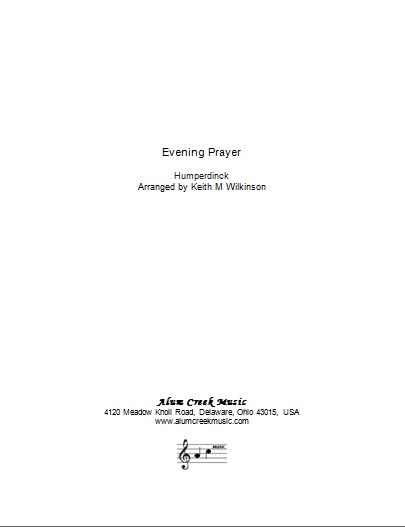 £24.00
£24.00Evening Prayer (Cornet Duet with Brass Band - Score and Parts)
This beautiful music is from the end of Act 2 of the opera Hansel and Gretel by German composer Engelbert Humperdinck (1854-1921). The duet is a prayer by the brother and sister as they seek the protection of angels before falling asleep on the forest floor. The opera, Humperdinck's most famous composition, is based on the fairy tale by the Grimm brothers, and has libretto by the composer's sister. It was first performed in December, 1893.
Estimated dispatch 7-14 working days
-
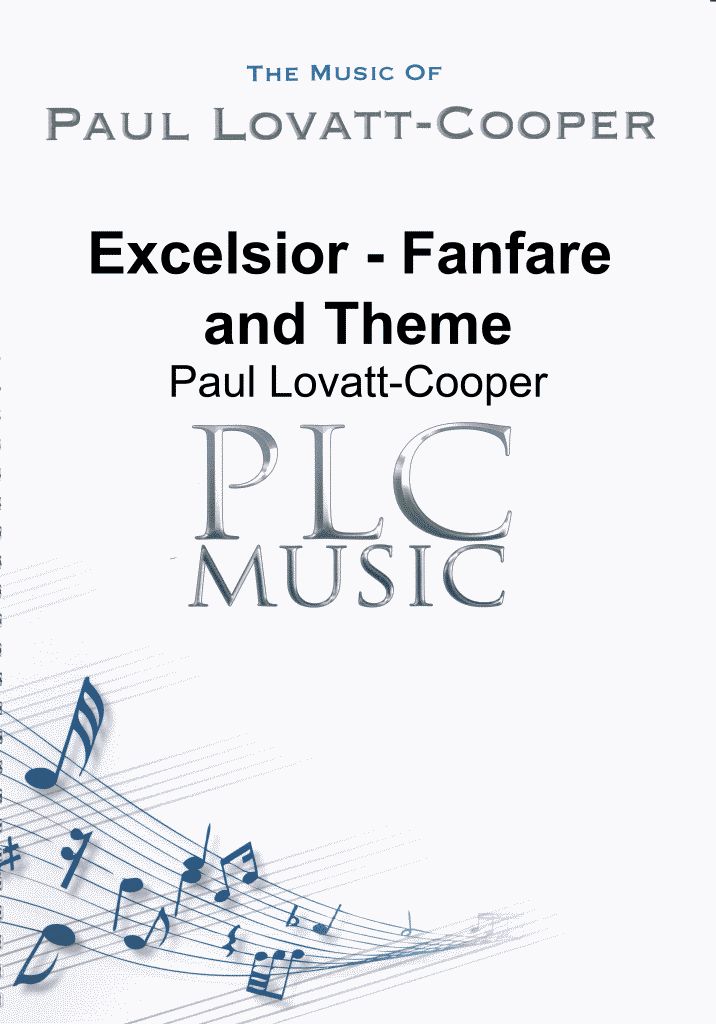 £29.95
£29.95Excelsior - Fanfare and Theme
The New Mills Old Prize Band is the inheritor of a proud tradition going back 200 years. Its origin lies in a brass and reed band formed in 1812 by Timothy Beard and it is one of the oldest brass bands in continuous existence in the UK.The New Mills Old Prize Band is inextricably linked to the Beard family. Timothy Beard the founder of the band, was one of five children and two of his brothers, John and Stephen, were to join him in the band.Excelsior is based on the hymn tune 'Ransom' believed to have been composed in 1838 by Timothy's brother Stephen Beard. I have taken this hymn tune and composed a concert fanfare utilising the main melodic material from the original hymn tune.The title of the piece comes from the bands original motto "Excelsior!"Paul Lovatt-Cooper
Estimated dispatch 7-14 working days
-
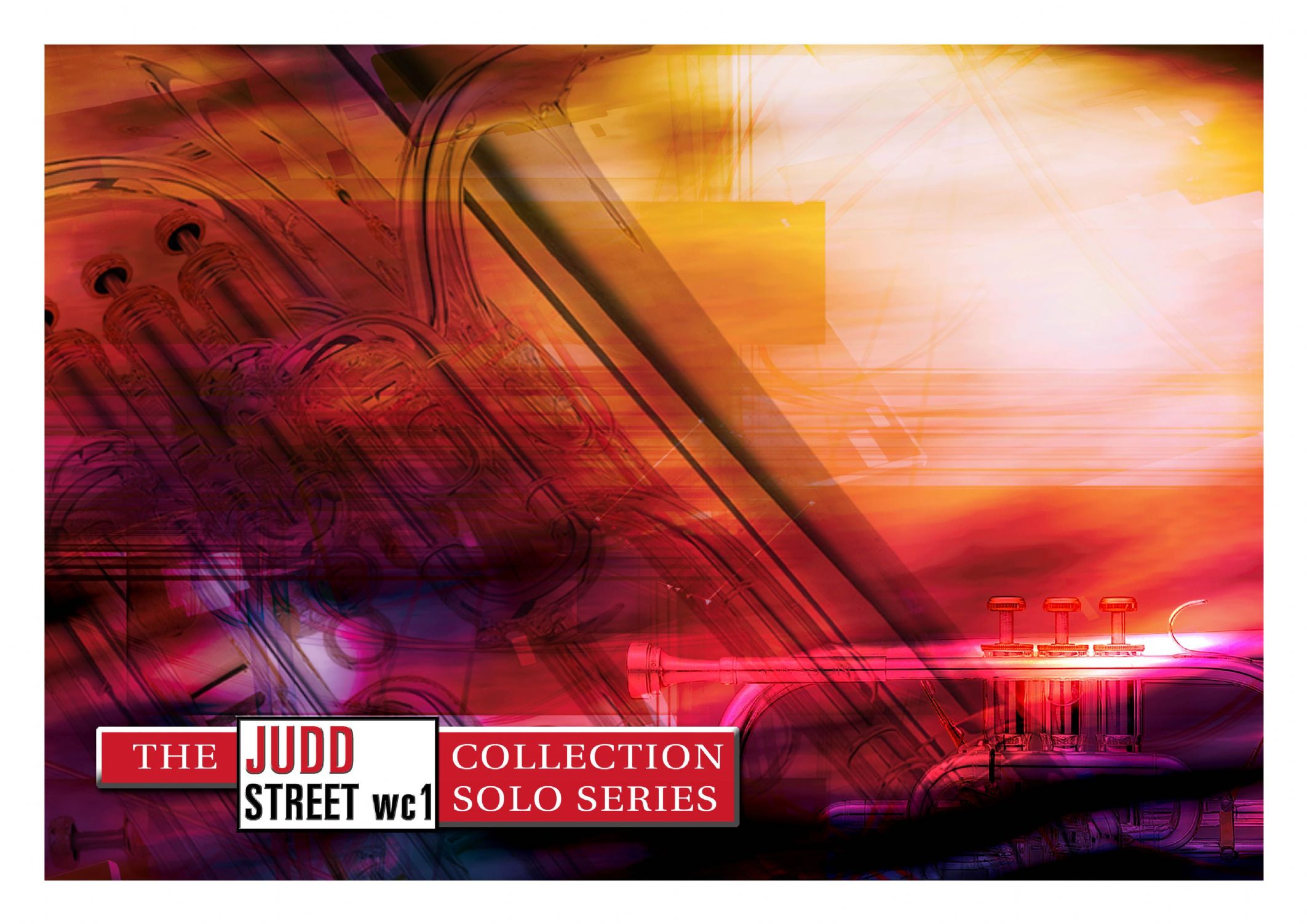 £29.95
£29.95Judd: A Joy Untold
This short, light-hearted solo has been described as The Salvation Army's answer to 'The flight of the bumble bee' and requires facility from the soloist and accurate accompaniment from the band. The solo opens and closes with whimsical references to Erik Leidzen's famous euphonium solo 'The Song of the Brother' and includes the tunes 'A robe of white' and 'I'll serve Thee'.
Estimated dispatch 7-14 working days
-
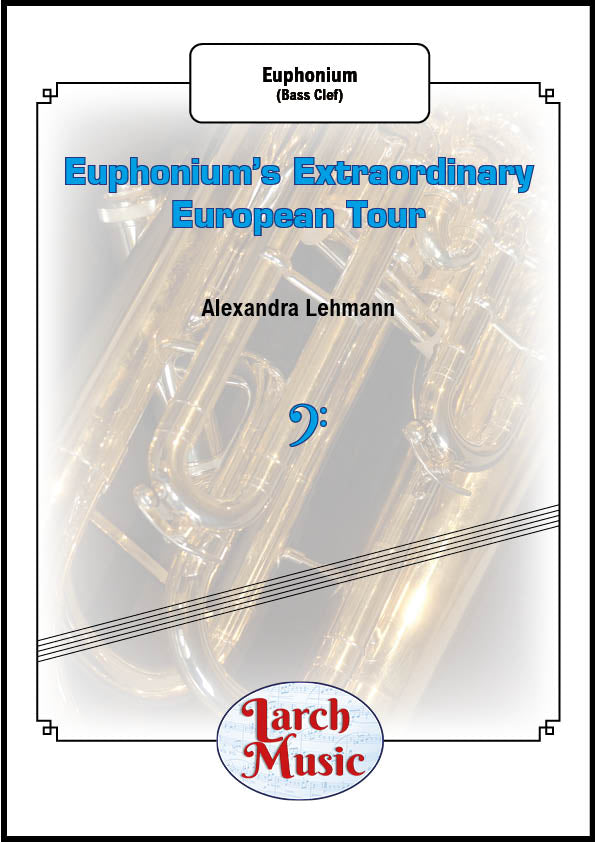 £9.95
£9.95Euphonium's Extraordinary European Tour - Solo Euphonium (Bass Clef) - LM171
COMPOSER: Alexandra LehmannEuphonium's Extraordinary European TourThe year 2020 will be infamously recorded as a time when musicians had to lead a solitary life, which is incompatible with musical activity.Furthermore, I wanted to offer an experience of travelling in Europe through music.There is a wealth of historical, and traditional European monophonic music.Hence, the Tour is based around the 14th-15th centuries whenEuphoniumencounters different musical cultures.The Tour is dedicated to my father, mother, brother, and sister;Jean-Pierre, Francoise, Fabrice, and Mahaut Lehmann;with whom I was fortunate to travel in my youth.CONTENTS1. Ostentatious OvertureEuphoniumis at the French palace of Versailles with all itspomp, splendour, and magnificence.2. Mystical MinnesangerEuphoniumhas travelled to the Holy Roman Empire, where he isperforming an ode to a Germanic Knight.3. Andalusian NightsThe Caliphate of Cordoba was a mixing-pot of Islamicand Judaic music. What is fascinating is that many of the ideas aroundperformance; modes at certain times of the day, improvisation into metred,faster sections; go back to the Indian subcontinent and even furtherback into Ancient Greece.Euphonium is chanting for theCaliphate on a warm summer's evening.4. Tarantella of the TagliatelleI don't know if the Medici family ate tagliatelle,but if they did, this joyful and lively tarantella is whatEuphonium would have played.5. Terrifying TropakA complete change of mood.Euphonium is playing for a swashbucklingperformance of Ukrainian Cossacks, with leaps, stamps, and twirls.6. Sami Herding SongIn the Arctic Norwegian north,Euphonium is with the Sami calling theirherd of reindeers with vocalisations that echo in the icy distance.7. Highland FlingEuphoniumis in Scotland taking part in the Highland Games.Female dancers perform athletic jumps.8. Royal Festive FanfareEuphoniumfinishes his European Tour at Windsor Castle, England.Like the natural trumpet (played at the time), the lower range is based on the first notes of the harmonic scale and announce the entry of the royal family.
In Stock: Estimated dispatch 3-5 working days
-
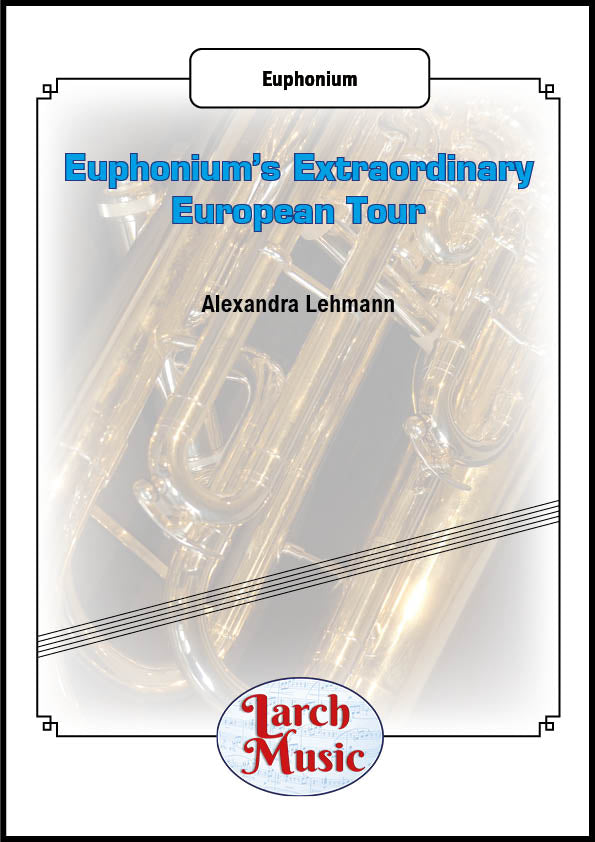 £9.95
£9.95Euphonium's Extraordinary European Tour - Solo Euphonium (Treble Clef) - LM168
COMPOSER: Alexandra LehmannEuphonium's Extraordinary European TourThe year 2020 will be infamously recorded as a time when musicians had to lead a solitary life, which is incompatible with musical activity.Furthermore, I wanted to offer an experience of travelling in Europe through music.There is a wealth of historical, and traditional European monophonic music.Hence, the Tour is based around the 14th-15th centuries whenEuphoniumencounters different musical cultures.The Tour is dedicated to my father, mother, brother, and sister;Jean-Pierre, Francoise, Fabrice, and Mahaut Lehmann;with whom I was fortunate to travel in my youth.CONTENTS1. Ostentatious OvertureEuphoniumis at the French palace of Versailles with all itspomp, splendour, and magnificence.2. Mystical MinnesangerEuphoniumhas travelled to the Holy Roman Empire, where he isperforming an ode to a Germanic Knight.3. Andalusian NightsThe Caliphate of Cordoba was a mixing-pot of Islamicand Judaic music. What is fascinating is that many of the ideas aroundperformance; modes at certain times of the day, improvisation into metred,faster sections; go back to the Indian subcontinent and even furtherback into Ancient Greece.Euphonium is chanting for theCaliphate on a warm summer's evening.4. Tarantella of the TagliatelleI don't know if the Medici family ate tagliatelle,but if they did, this joyful and lively tarantella is whatEuphonium would have played.5. Terrifying TropakA complete change of mood.Euphonium is playing for a swashbucklingperformance of Ukrainian Cossacks, with leaps, stamps, and twirls.6. Sami Herding SongIn the Arctic Norwegian north,Euphonium is with the Sami calling theirherd of reindeers with vocalisations that echo in the icy distance.7. Highland FlingEuphoniumis in Scotland taking part in the Highland Games.Female dancers perform athletic jumps.8. Royal Festive FanfareEuphoniumfinishes his European Tour at Windsor Castle, England.Like the natural trumpet (played at the time), the lower range is based on the first notes of the harmonic scale and announce the entry of the royal family.
In Stock: Estimated dispatch 3-5 working days


